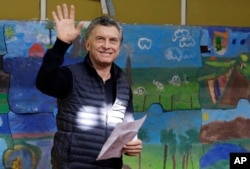Polls closed in a closely watched mid-term primary legislative election in Argentina on Sunday that is seen as a test of voters' appetite for bringing back the left-wing populism of former President Cristina Fernandez.
Local television channels did not immediately make projections in Buenos Aires province, where Fernandez is vying for a Senate seat, a sign the results will be close. The first official results are expected around 9 p.m (0000 GMT).
Fernandez, who was indicted for corruption last year, is running against business friendly President Mauricio Macri's former education minister and other candidates from a divided opposition in the province home to nearly 40 percent of voters.
Investors and wealthy Argentines fear a Fernandez comeback in Congress could provide a springboard for a presidential bid in 2019. Her return to power would likely mean the end of Macri's reforms, higher public spending, protection of industry and isolation from trade agreements and international capital markets.
A seat in Congress would give the 64-year-old Fernandez immunity from arrest, though not from trial. She dismisses the corruption accusations as politically motivated.
The compulsory primary vote on Sunday essentially serves as a detailed poll ahead of the Oct. 22 election for one third of the Senate and half the lower house of Congress, as no major candidates are being challenged from within their own parties.
Argentina's peso has weakened around 9 percent since Fernandez, who was president from 2007 to 2015, formed a new political party and declared her candidacy on June 24.
Traders have priced in a Fernandez win by a margin of around 3 percentage points on Sunday, according to J.P. Morgan. Local brokerage Portfolio Personal said the market expected her to win by between two and 4 percentage points.
Fernandez appeals to many in Buenos Aires province's struggling industrial belt, where Argentina's emergence from recession in the second half of last year has yet to take hold.
"Macri made an adjustment that only benefited the millionaires. There's more poverty and more unemployment," said Enrique Greco, 47, a public employee in the province.
The final weeks of primary campaigning were marked by headlines highlighting gaffes from Esteban Bullrich, Macri's former education minister and scion of a wealthy Buenos Aires family. On Wednesday, he apologized for calling the jailing of young people "progress."
Fernandez, who broke with Argentina's main opposition movement of Peronism for the election as some adherents formed more moderate factions, ran a relatively subdued campaign compared with her populist rhetoric and long speeches as president.
In an interview for the Reuters Latin America Investment Summit on Tuesday, Macri admitted the race would be tight in Buenos Aires province, but insisted that his coalition would win on a national level.
Among the areas where his government is running ahead of the opposition is Buenos Aires City, which votes separately from the province of the same name.
"It's true that the government hasn't completed some of the things they promised, but little time has passed and they've needed to solve so many inherited problems," said Abel Giles, 39, a poultry merchant from the city.






